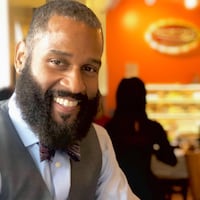One of three Louisville police officers has been charged in connection with the March killing of Breonna Taylor, whose shooting death in a botched drug raid sparked national outrage and months of protests.
Watch Kentucky Attorney General Daniel Cameron’s news conference:
Former Louisville Metro Police Department Officer Brett Hankison, who was fired in June, was not charged with murder in Taylor’s death, but he faces three counts of first-degree wanton endangerment for shooting into neighboring apartments on the night of the raid, according to reports.
His bond has been set at $15,000.
Each felony count carries a penalty of up to five years in prison, according to reports.
Family attorney Ben Crump described the grand jury decision as “outrageous and offensive” and “not fully what we wanted” but conceded that the indictment “brings us closer to justice.”
A termination letter sent to Hankison on June 23 by interim Louisville Police Chief Robert Schroeder said the officer had violated procedures by showing “extreme indifference to the value of human life” when he “wantonly and blindly” shot 10 rounds of gunfire into Taylor’s apartment in March.
The other two officers — Jonathan Mattingly and Myles Cosgrove — remain on administrative leave pending an ongoing internal investigation.
‘Use of force justified’
Kentucky Attorney General Daniel Cameron is now faced with the option of whether to prosecute the case against Hankison.
At a news conference in the state capital Wednesday, Cameron said the use of force by officers was justified because Taylor’s boyfriend, Kenneth Walker, was the first to open fire when police burst in, wounding Mattingly.
Cameron said Hankison and the other officers who entered Taylor’s apartment announced themselves before entering — and so did not execute the warrant as “no-knock,” according to the investigation.
“According to Kentucky law, the use of force by (Officers Jonathan) Mattingly and (Myles) Cosgrove was justified to protect themselves,” he said. “This justification bars us from pursuing criminal charges in Miss Breonna Taylor’s death.”
“Sometimes the criminal law is not adequate to respond to a tragedy,” he added.
Cameron, a Republican, is the state’s first Black state attorney general and a protege of Majority Leader Mitch McConnell who has been tagged by some as the senator’s heir apparent. Cameron was also included among 20 names on President Donald Trump’s list to fill a future Supreme Court vacancy.
“This was a gut-wrenching and emotional case,” he said. “My job as special prosecutor was to put emotions aside and investigate the facts.”
Cameron said he would next establish a task force to examine how warrants are carried out in the state but that he does not expect any additional charges in the case.
Protests in Louisville
The announcement sparked immediate protests in downtown Louisville, where a large crowd gathered and marched through the streets, clashing with police.
Hours later the scene intensified, with police declaring “an unlawful assembly,” reports said. Law enforcement had already restricted access in Louisville’s downtown area. A few arrests were reported as hundreds of officers swarmed the area. Multiple protesters were subdued with zip ties and seated in the streets.
Police reportedly fired pepper balls and tear gas into the escalating crowd. Tables and chairs were reportedly thrown at a nearby restaurant.
A 72-hour curfew was set to take effect throughout the city beginning Wednesday night.
A day earlier, Louisville Mayor Greg Fischer declared a state of emergency due to the potential for civil unrest resulting from the closely watched announcement.
Other mayors of major U.S. cities also mobilized multiple law enforcement agencies, including federal agents and the National Guard, in the event of protests.
Kentucky Gov. Andy Beshear cited the intense scrutiny of the Taylor case in Louisville and around the country as justification for the lockdown measures taken by Louisville police.
“The national attention here is so great, the potential for outsiders so significant, the possibility of someone taking something peaceful and trying to turn it into something that’s not is all there,” Beshear said during his daily briefing Tuesday.
The night Breonna Taylor died
Taylor, a 26-year-old Black emergency medical worker, was shot multiple times March 13 by officers who entered her home using a no-knock warrant during a narcotics investigation.
Walker was charged with attempted murder of a police officer, but prosecutors later dropped the charge after Walker said he heard knocking but didn’t know who was coming into the home and fired in self-defense.
The warrant used had been connected to a suspect who did not live there, and no drugs were found inside.
Continued calls for justice
Neither the grand jury nor the presiding judge would comment on Wednesday’s indictment.
Social media erupted immediately after the announcement, with voices expressing frustration that the grand jury did not do more.
“Justice has NOT been served,” tweeted Linda Sarsour of Until Freedom, a group that has pushed for charges in the case. “Rise UP. All across this country. Everywhere. Rise up for #BreonnaTaylor."
Taylor’s name became a rallying cry in the larger social justice movement that emerged in the wake of George Floyd’s death in May. Her image has been painted on streets, emblazoned on protest signs and silk-screened on T-shirts worn by celebrities, professional athletes and activists around the country.
Taylor’s family has joined in the months-long campaign to pressure officials to bring charges against the officers. Oprah, Beyoncé and LeBron James are among the heavyweights who have attached their names to the cause.
Amid the uproar, Louisville’s Metro Council banned the future use of no-knock warrants.
Last week, the city of Louisville also settled a lawsuit from Taylor’s family for $12 million and pledged several police reforms as part of the agreement.
Information provided by The Associated Press was used to supplement this report.
About the Author
The Latest
Featured


